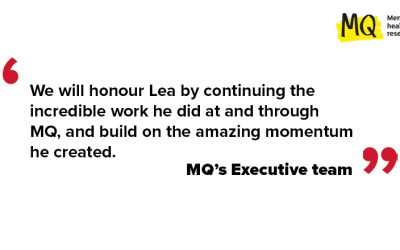This week is Children’s Mental Health Week and this year more than every concern over children’s mental health is growing. Services are overstretched with CAMHS referral rates increasing 54% year on year.
Over half of all mental health disorders start before the age of 14, with 75% beginning by the age of 24. Rates have been increasing since 2017, from one in nine to one in six in 6 to 16 year olds.
This is why MQ is calling for the law to be changed to help prevention of mental illnesses in children and teenagers. And we know research is key to helping children with their mental well-being in the future.
From June 2021 to June 2022 there were 1.17m referrals to Child and Adolescent Mental Health Services (CAMHS) in England. Whilst the service aims for all referrals to be seen within a fortnight, realistically it can take far longer. Some might opt for private therapy but given the cost of living crisis this option is not available to everyone.
Emma Taylor, CAMHS, says
“All parents want to do their best by their children and young people. And it can feel challenging when we’re struggling at times ourselves.”
Many parents, guardians and caregivers want to help our children and young people but with services beyond capacity and the cost of private therapy meaning that option is not accessible to many, the question is what can we do to help otherwise?
Here’s six ways you can help a child with their mental health right now and for free.
Spend time
Whether it’s a child who is a family member, of whom you’re a parent or guardian or whether it’s a child you care about, taking time with the child to listen, play, have fun, ask questions and make the child the forefront of the conversation. It’s a great way to check in with the child and hear the reality of what it is their going through. Designate regular catch up times. To be fair, this is good no matter what your age.
Play and get active
Getting active with another person is a great way to help your mental health. And spending time playing helps bond those taking part. Some children might find it hard to open up but if they can play games or exercise with an adult their body is more likely to feel relaxed and at ease. Whether it’s dancing, running, board games, video games all of it will help the child feel safer and more able to bond.
Write together
Writing can be a powerful tool for us all. If you suggest a child write some answers, with you also writing to answer the same questions, it can help you both to open up about your experiences, mood, mental wellness. If you answer prompts together it can help you both to share perspectives. Perhaps suggest prompts like “This week I’ve felt mostly…” or “5 things I’m happy about this week” or “5 things I am sad about this week”. Prompts to do with feelings, gratitude, pride and accomplishment can help to open up conversations and focus the mind.
Talk About Your Mental Health
Being open about how you are sets an example young people around you will notice. Learning from examples set is how many of us learn how to grow and develop. Talking openly about what helps you with your mental health, about your feelings and what you find difficult can be really beneficial and helps to show children and young people that they can be open and honest too.
Encourage creativity
Whether it’s drawing, cooking or using clay or something totally different, encouraging children and young people to express themselves differently is hugely helpful for mental health. Being creative and artistic can be a big relief, without boundaries and help young people and children to communicate beyond words sometimes.
Watch a film and talk about it
Films and TV series can be great at opening up conversations. Why not choose a film and spend time during the film and afterwards to talk about the characters’ experiences, how they communicate and what it reminds you and the child or young person of? Using cinema therapy like this to talk about an external and fictional character’s experience gives insight into how you and the other person experiences similar struggles.



